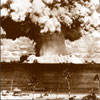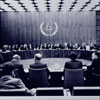Research Interests
Having focused as its first priority on the rivalry of the two Cold War alliances and its consequences for the contemporary world, the PHP has accomplished a wealth of its original goals in 1999-2006:
• Declassification, evaluation, and dissemination of documents from previously closed archives in East Central Europe;
• Analysis and interpretation of the new sources at international conferences;
• Dissemination of research results to academic and general audiences in print and online.
The development of the Project has benefited from its focus on archival documents, its commitment to freedom of information, and its flexible network of dedicated partner institutions. As a result, the Project has grown at a fast pace in terms of the documentation it was able to obtain, the global outreach it has achieved through its website as an online publishing house as well as through numerous international conferences, and the network of institutions and individual scholars it has brought together. Foreign Affairs has called the PHP the “most ambitious and integral project in the burgeoning field of Cold War history.”
In the future, the thrust of PHP research interest is in the recent historical origins and development of current security issues and institutions on the basis of newly available documentary evidence. To obtain such evidence, the project will continue to collect newly declassifi ed archival sources, promote declassifi cation of still classified documents, sponsor oral history interviews and roundtables with former policy makers and other witnesses of the time. It will publish documents, in original and in English, and the results of research on the PHP website as well as in printed form, particularly in its series of CSS Studies in Security and International Relations (London and New York: Routledge).
The project's main issues of research interest are:
 |
The European Security Model. Following on conferences, “NATO, the Warsaw Pact, and Détente, 1965–73” (Dobbiaco 2002), “The Road to Helsinki: The Early Steps of the CSCE” (Florence 2003), “At the Roots of European Security: Thirty Years since the Helsinki Final Act” (Zurich 2005). Research on the CSCE/OSCE, WEU, and CFSP in Historical Archives of the European Communities (Florence), records of the Western European Union and of the Conference on Security and Cooperation in Europe in its member states (USA, Canada, Western and Eastern Europe), records of the OSCE, oral history interviews. | |
 |
NATO Enlargement and Its Out-of-Area Problem. Following on conferences, “NATO in the 1960’s: Challenges beyond Deterrence” (Zurich 2004) and “A Strained Partnership: European-American Relations and the Middle East from Suez to Iraq” (Zurich 2006). Research on early enlargements (Greece, Turkey, Spain), France, Belgium, Portugal and their colonial wars, the Vietnam War, and Middle East confl icts in NATO Historical Archives (Brussels), archives of NATO member states and of former Warsaw Pact countries. | |
 |
Regional Security in Asia, Latin America, and Africa. Following on the conference, “Mongolia and the Cold War” (Ulanbaatar 2004) and oral history roundtables with Chinese and East European diplomats as well as Chinese and West European diplomats (Beijing 2004, Shanghai 2007). Research on regional security projects (Baghdad Pact, SEATO, ANZUS, Nonaligned Movement, ASEAN, Arab League, Organization of American States, Organization of African Unity, and others) in regional archives, UN Archives (New York), OAS archives, US National Archives, and UK National Archives (Kew/London); interviews and oral history roundtables. | |
 |
Threat Perceptions, Strategic Doctrines, Military Plans: Overcoming the Legacies of the Cold War. Following on the publication by the PHP of A Cardboard Castle? An Inside History of the Warsaw Pact (2005), War Plans and Alliances in the Cold War (2006), conference on “Military Planning for European Theatre Conflict during the Cold War” (Stockholm 2006), and research in Bulgarian archives on arms trade. Research on national enemy images, changing nature of deterrence and neutrality, “revolution in military affairs,” arms trade, civil wars and greatpower involvements in the Third World in US National Archives, Western and Eastern European military archives, party and foreign ministry archives in Moscow, Russian Central Archives of Economics, NATO, and other archives. | |
 |
Peacekeeping and Nongovernmental Organizations as New Security Factors during and after the Cold War. Following on publications by PHP-affi liated Institute of Military Studies in Vienna and Netherlands Institute of Military History. Research on UN peacekeeping operations in Cyprus, Middle East, Congo, India- Pakistan, Dominican Republic, West New Guinea, Iran-Iraq, Angola, former Yugoslavia, and others in UN, US, British, Netherlands, and other archives, and in NGO archives. |

